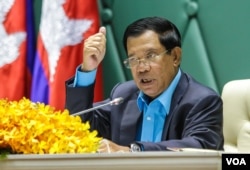Prime Minister Hun Sen has said that Cambodia will sign 28 agreements with China during Chinese President Xi Jinping’s visit to the Kingdom next week.
Speaking at a graduation ceremony in Phnom Penh on Thursday, Hun Sen said that Xi would arrive for a two-day visit on October 13.
“According to the plan, if there is no change, at least 28 agreements and protocols will be signed,” he said.
China has distributed about $15 billion in loans to Cambodia in the past two decades. It has already pledged $600 million this year.
The premier did not elaborate on what areas the agreements would cover, but said that the visit would focus on trade and access to the Chinese market for products such as rice and cassava.
He added that trade between the two countries was expected to reach $5 billion next year, up from $4 billion in 2015.
Xi’s visit comes amid a wave of criticism against Cambodia from the international community over what western countries have described as politically motivated legal action taken against members of the opposition, human rights workers and government critics.
Cambodia has also come under fire for its stance on the South China Sea dispute, where it is seen as supporting China’s claims by blocking Asean statements that mention the standoff. However, Cambodia maintains it is neutral.
Ou Virak, founder of the Future Forum research institute, said Cambodia will benefit from the agreements with China in the short-term, but added that a pivot towards China could further endanger human rights and democracy in Cambodia.
“Firstly, China does not respect human rights and, secondly, China is a communist country, so China supports other countries to follow its political path,” he said.
“This means that China does not want democracy to succeed, because if democracy succeeds it means the Chinese people can also demand a change of regime in China,” he added.
Phay Siphan, a government spokesman, said the agreements were purely economic in nature and “not related with politics.”





